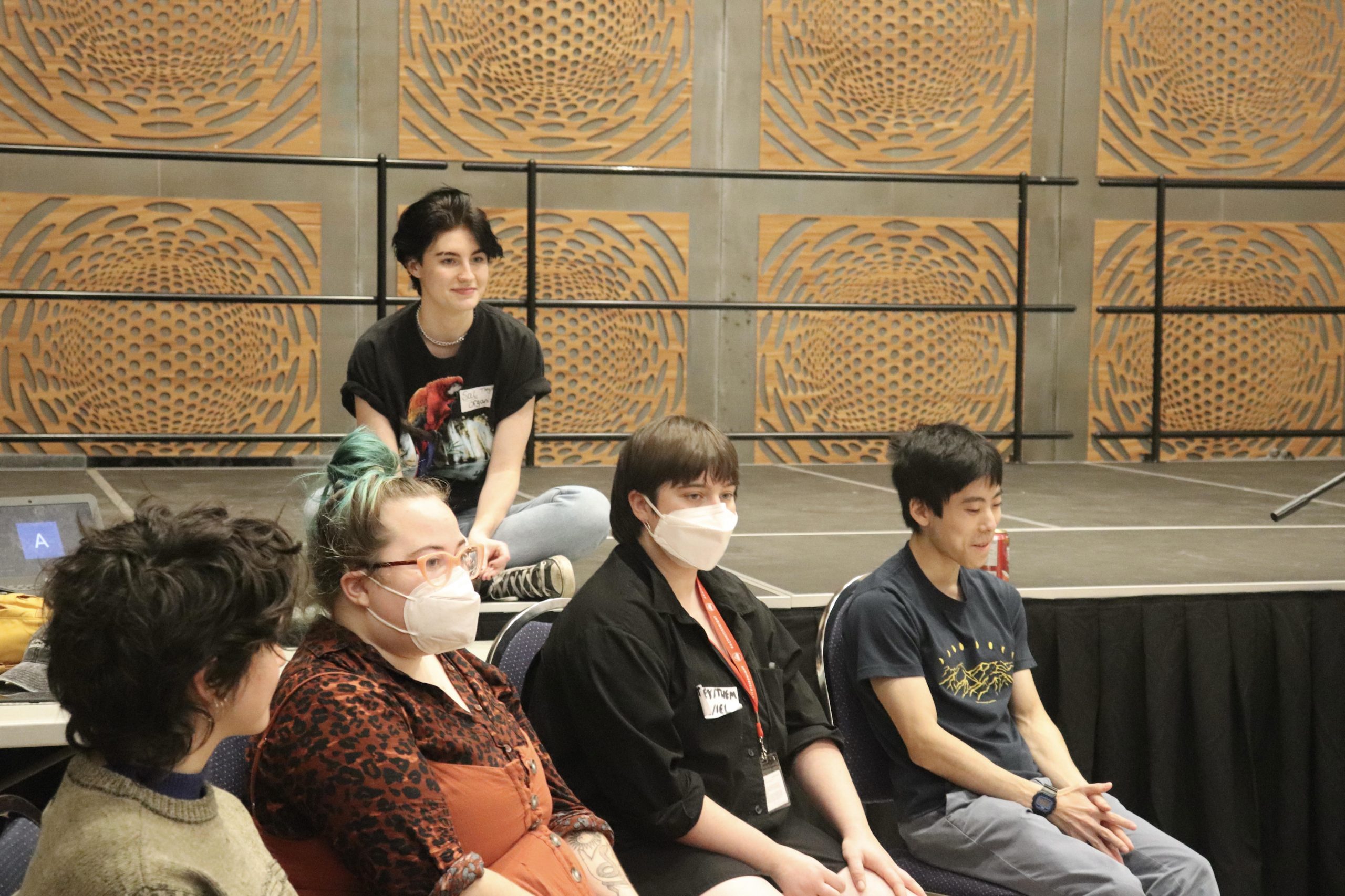
OUR COMMITMENT TO ACCESSIBILITY
The Necessity of Addressing Accessibility At McGill
Numerous systemic barriers which impede many members of the McGill student body still exist on and off the McGill campus. With the lack of accessibility measures associated with student life and learning, we recognize that SSMU must show leadership in meeting the needs of all members. By demonstrating its commitment to accessibility and the support of disabled students, SSMU hopes to aid in building a stronger and more equitable community at McGill. SSMU will remain transparent with the student body about the steps being taken with regard to accessibility, and will consult the student body on their experiences and opinions whenever possible.We will further engage with the reality of ableism in meaningful ways, while recognizing that disability does not exist in isolation, and often intersects with other identities and adversities.
SSMU aims to uplift the voices of our disabled members, and strives toward creating a more inclusive environment and more accessible system of member participation. SSMU also hopes to eliminate all barriers to participation in SSMU’s governance structures and decision making processes. Further, SSMU will ensure that policies and procedures will take into account the needs of disabled peoples, and that for all events and initiatives, SSMU will take action to remove any barriers that may exist.
The Accessibility Position (p. 3 of the Position Book) details SSMU’s beliefs in matters of accessibility.
Accessibility Policy
The Accessibility Policy was adopted to operationalize the SSMU’s commitment to accessibility and the prioritization of the needs of students with disabilities. It was first adopted in 2016, revamped in 2021, and is now inscribed in a social model of disability (see policy). The model maintains that systemic barriers to participation and exclusion are the primary contributing factors to an individual’s experience of disability, and therefore helps to establish the significant role society plays in accessibility and ableism.
The Accessibility Policy mandates the Society to take action in six areas associated with barriers to accessibility within the context of the SSMU: communication and promotions; programming and events; physical access; student groups; advocacy; and SSMU governance. In doing so, SSMU is expected to advocate, organize and act around principles of anti-oppression and solidarity as they are defined in the policy.
It is this office’s responsibility to promote a culture of accessibility, raise awareness about accessibility issues on campus and in the community at large, and advocate for the improvement of accessibility of the physical, social, and learning environment of the University as wells as for the elimination of all physical, social, and financial barriers preventing a student from receiving the necessary accommodations to fully access academic or social services provided by the SSMU and the University. This includes but is not limited to advocacy for the improvement of the Office for Students with Disabilities (OSD) and initiatives like the Open Educational Resources and the Students from Care projects.
The Office of External Affairs is also mandated to advocate for increased accessibility measures at the municipal, provincial, and federal levels of government, notably advocating for a more robust and comprehensive framework for ensuring accessibility in the City of Montréal. At the university, this Office advocates for more physically accessible sidewalks surrounding McGill University during snowy weather.
SSMU recognizes the work of accessibility-based organizations, and works to amplify them. The External Affairs office is mandated to support and amplify the advocacy of those organizations, particularly organizations that work at the post-secondary level, such as the Association québécoise pour l’équité et l’inclusion au postsecondaire (AQEIPS).
This Office continues to collaborate with the Accessibility Commissioner to produce research reports and to develop more concrete directions for accessibility advocacy at all levels of government.
Accessibility Commissioner
The Accessibility Commissioner acts as the Chair of the Accessibility Committee, provides consultation on matters of accessibility, oversees the implementation of the protocols mandated under the SSMU Accessibility Policy, and more. They act as a point of contact for all members of SSMU, student clubs, and executives regarding the organization of accessible events, the dissemination of accessible online content, and general advice and discussion on accessibility policies at SSMU.
Another central task under the portfolio of the Accessibility Commissioner is the designing and implementation of a reporting mechanism under the Accessibility Policy for accessibility complaints; similar to the SSMU Equity Complaints process. The form used to lodge a formal complaint on issues of accessibility or ableism within the SSMU community is linked below.
This form’s responses are viewed only by the Accessibility Commissioner, who may advocate individually for a change to be made, or coordinate with SSMU executives to have a concern addressed, depending on the nature of the complaint.
Feel free to email the Accessibility Commissioner with any additional concerns, questions or comments at: accessibility@ssmu.ca
The confidential Wufoo form to submit an accessibility complaint can be found here.
Accessibility Resources
McGill Resources – Students:
SSMU remains critical of the support offered by McGill. To learn more about how McGill is failing its disabled students we invite you to watch this video by Tristan Surman and Bilal Virji of the McGill Tribune (12 minutes, with captions).
- Office for Students with Disabilities (OSD):https://www.mcgill.ca/osd/
- The McGill Accessibility Toolkit (transport, building access, event and meeting planning material): https://www.mcgill.ca/equity/resources/disability/accessibility-toolkit-and-resources
- McGill Library Accessibility Information: https://www.mcgill.ca/library/services/access
McGill Resources – Faculty:
- Guide for Staff with Disabilities: https://www.mcgill.ca/apo/staff-guides/guide-staff-disabilities
- Building an Accessible Course in MyCourses: https://www.mcgill.ca/equity/article/building-accessible-course-mycourses
- Teaching Students with Disabilities at McGill: https://www.mcgill.ca/equity/article/teaching-students-disabilities-mcgill
Resources for Accessible Event Planning:
- Accessible Design: https://drive.google.com/file/d/1XD3mkyVrKfLz1flrqvpMmUVtSEegGGjo/view?usp=sharing
- Accessible Event Planning in the McGill context
- Slides: https://drive.google.com/file/d/1iVpFwJn_53Wtnhyi9PvM6pYNtBR8HOdu/view?usp=sharing
- Sustainable events team (has a checklist for accessibility and inclusivity standards when event planning): events.sustainability@mcgill.ca
- Recording: https://youtu.be/eNZGYrV-BtY
- Resources to find interpretation: https://www.chs.ca/service/chs-interpreting-services
